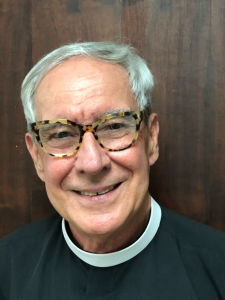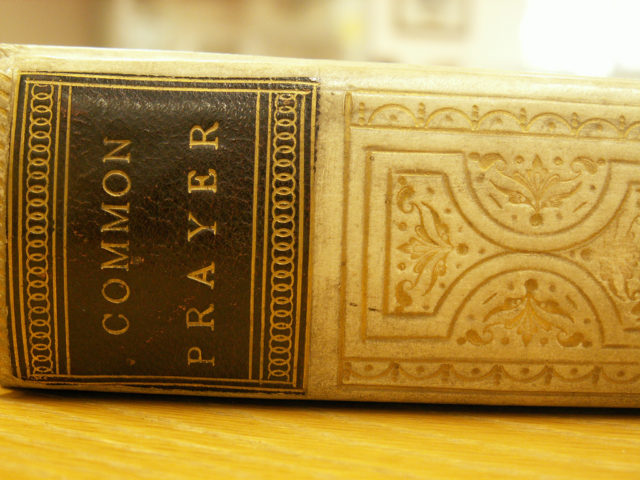By Juan M.C. Oliver, Custodian of the BCP
 The first word coming to mind at the thought of new liturgical development called for by the 79th General Convention is anxiety. Looking at it closely, I find two types of anxiety both in myself and in others discussing the matter.
The first word coming to mind at the thought of new liturgical development called for by the 79th General Convention is anxiety. Looking at it closely, I find two types of anxiety both in myself and in others discussing the matter.
The first is knee jerk anxiety. “Who moved my cheese?” is its mantra. It is the stress in the face of change, at the prospect of the new, at standing before the yet unknown, of possible loss. We all feel it, it is natural and human, and it needs to be addressed before it spirals into paranoia. All pastors, in all orders of the Church have an obligation to honor and assuage this anxiety.
Sometimes, however, in some personality types the anxiety is not emotional so much as intellectual. Not too threatened by the new, not too worried about the possibility of losing familiar formulations, we concentrate, rightly, on the possible loss of key concepts that we have deemed essential to our faith for two millennia. Its mantra is “loss of orthodoxy.” And every thinker in this Church, in all orders, has an obligation to honor and assuage this type of anxiety as well.
Let me concentrate here on the second type, intellectual anxiety, which, I find, often becomes the tool of an underlying knee jerk anxiety. I ask you for a minute to think with me, regardless of you may feel about liturgical development. I limit myself to literary orthodoxy, Since we are considering the creation of texts, leaving aside extremely important concepts like orthopraxis and the role of the non-verbal elements of worship.
It seems to me that the (rightly) maligned term, “orthodoxy,” responsible for such much exclusion and violence in Christian history, and trotted out so often to serve our infinite thirst for power and control, does have some validity if we stay close to its core meaning of “right praise,” further enriched by Vincent of Lerins’ (no liberal he) insistence that orthodoxy is what has been believed by all Christian at all times, everywhere.
Church historians just perked up, for they know that Vincent is referring to a very small core. Further, this tiny core that is orthodoxy has practically nothing to do with anything nonverbal, like choice of vestments, if any, or church architecture, musical styles, liturgical styles, or whether women should wear jewelry at the altar. By and large orthodoxy is a verbal matter.
Additionally, although orthodoxy has Scriptural roots, it is also an aspect of Tradition. For Anglicans, however, these two legs must be joined with another, Reason, in order to be authoritative. This means that human reason must be brought into dialogue with Scripture and Tradition in any understanding of what constitutes orthodoxy in worship.
Since we are talking about the revision or development of liturgical texts, this implies, in practice, that we must also consider anthropology, ritual studies, philology, the history of our liturgical language, as well as our knowledge of the original Christian languages of worship (Aramaic, Hebrew and Greek), their contexts and the history of translation of our liturgical vocabulary into English. This especially important, for Thomas Cranmer, when writing our first two prayer books, used already existing terminology, without questioning it. He did not know much Greek. He trusted Tyndall, who did not evaluate this vocabulary for accuracy either, perhaps because it was so widespread, having originated eight hundred years earlier, in the Anglo Saxon biblical commentaries and sermons of the eighth century. Some of those translation choices are, in my opinion, not very good when compared to the original Greek terms in their context, –as David Bentley Hart has shown in his recent translation of the New Testament.
Verbal formulations of our faith consist, like all signs, of statements and the concepts they refer to. It is only natural for monolingual persons to assume that the words are the concepts, but anyone who can order dinner in a different language knows from experience that the same piece of beef may also be Rindfleisch, carne, boeuf, manzo, etc. Words are not the concepts they re-present, but make them available to the mind in a given cultural, linguistic, social, even economic context. Their meaning is socially owned by a community and is prone to change over time, as the context changes. I know this from experience. My niece, only forty years younger, already uses some slang terms in Spanish in slightly different ways from mine. Language is always changing.
For this reason it is a very salutary exercise to try translating orthodox formulations into different ways of saying the same thing. In the process we fine tune the concept and hone it down to its essentials, beyond specific formulations.
Writing in the fourth century, for example, Athanasios of Alexandria, in his On the Trinity, explained, speaking of the First Person of the Trinity that, “we call him Father because he is the Source.” No, he did not know about the female egg (ovum) which was not discovered until 1928. Now we know better. You get my point: Athanasos is getting behind “Father” to grasp the concept lying behind that term. We do not call the First Person Father because the First is male, but because the First is the Source. That is the orthodox concept: the First Person is the Source, not only of all that is, but of the Word and Spirit as well. This same concept may be expressed in different ways.
In light of this I want to distinguish between literal orthodoxy and analogical orthodoxy. Literal Orthodoxy is just that: a formulation that repeats literally the original statement (usually in Greek), in as literal a translation as possible.
But of course, the problem is that literal translations are not very good at conveying the original concept fully (as we know from the wooden translations we currently have into Spanish and French), and almost useless when one is translating an analogy. This is crucial, for as Aquinas taught, all our statements about God must be analogous approximations, for God is, as the Eucharistic Prayer of St. John Chrysostom says, “…ineffable, inconceivable, invisible, incomprehensible.”
If we dare name God at all, it is because of the Godhead’s loving condescension to send the Word to be one of us, circumscribing (materially, culturally, and yes, sexually) the Word in a concrete, man in a specific time, place and culture. But the point of the incarnation is not to save manhood, but all humanity, and so the maleness of Christ is a true, but relatively non-signifying element of orthodoxy, certainly not as important as his humanity. Even the Nicene-Constantinopolitan creed states, “… for us human beings (“men” is a mistranslation of ἀνθρώπους, anthropous), he came down from heaven, … and “…became a human being,” (ἐνανθρωπήσαντα, enanthropesanta).
Further, since very few of us live in the first century and think, speak, and experience life in koine Greek, we must needs be Christians in translation. This presents a serious challenge, for translations are never exact. At their best they are very close approximations, through which the original concepts of a specific people, in a specific language, in a specific culture, place, and time, are turned into analogous equivalences recast in our culture, language, place and time: the idioms, syntax and rhetoric of say, English speaking Americans today.
For those of us who can experience the world in more than one language, this insight is obvious. Perhaps, though for people who live in one language, the idea that a concept might be rendered faithfully in different phraseology is foreign, —at times even threatening. It must feel like their world is undermined if, for example, “You created all things and fill them with your blessing” is cast differently as “all your creatures are full of your blessing,” or even, “you crafted the worlds; they are full of your blessing.”
So to conclude, I would ask us to reflect upon our anxiety: to winnow out our emotional anxiety from our intellectual anxieties, to help and get help with both, and above all, to trust the Holy Spirit which is in the Church, the Communion of Saints; for every Sunday we claim to believe in them. For this is the New Jerusalem, coming down from heaven decked out like a bride in our own contemporary languages, peoples and nations. Do not confuse it with the sky falling.

